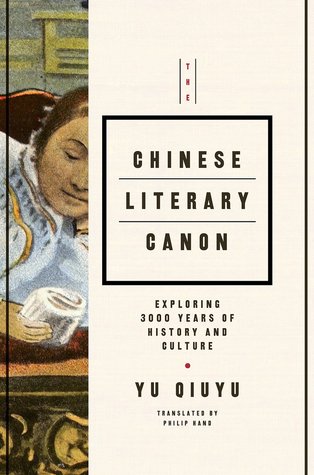To be honest, I almost gave up after the first chapter. The first chapter is the introduction and there were so many names referenced that I got thoroughly lost and thought I would never understand. But I decided to continue reading and the book got much, much better.
The Chinese Literary Canon is basically a series of essays exploring various aspects of Chinese literature in chronological order. The writing is expressive and elegant and it feels like a passionate teacher is standing in front of you, delivering a lecture (an interesting lecture, I should add). This isn't an unbiased account of history, this is one man's summation of his view of Chinese literature and the passion shines through every word.
There is so much of the book that is quotable, which is to say it rings true to me. For example, when talking about myth, the author writes:
"Why are myths and legends so often treated with contempt by historians? For one, they do not respect the boundaries of time and space, and because they free our imagination."And when talking about Ruan Ji and his flouting of convention, the author notes that:
"This is a story that we have seen a thousand times throughout history: The prodigal son is often more true to the kernel of meaning than the most well-trained mommy' boy who follows every rule."And when talking about the Tang Dynasty, the author touches on the idea of cultural purity and notes that:
"In truth, excessive purity is like a glass plate. It may be highly polished and crystal bright; but it is still small, thin, fragile. One day, some slight pressure will crack it, and it will cut your fingers.
And in any event, isn't glass a compound? Can it really claim purity?"There was only one chapter that struck me as slightly odd. In the chapter on Chinese archaeology, the author talks about the disruption the fall of the Qing dynasty has on the progress of Chinese archaeology, but completely neglects to talk about the effect of the cultural revolution and World War II. It may be that there is nothing worth talking about, but I found the gap to be odd.
I will not pretend that reading this has given me a grasp of the Chinese literary canon. While I feel like I understand more than I did before, large parts of the book still elude me. In the end, I read and let the words flow over me, grabbing what I could and letting go of the rest. I don't know if it's possible, but I would like to learn a bit more about Chinese literature and then reread this book, to see what a second reading would bring.


Books about literature can be so fascinating. I sometimes feel a bit left out when reading books about books or authors I am not too familiar with, but sometimes it leads me to wanting to try them. I know nothing about Chinese literature, and I like that the author's passion stands out so much in this book. I think this would be a very interesting book to read!
ReplyDeleteIt would be! I know very little about Chinese literature too (only what was in Chinese lessons and a bit of the Romance of the Three Kingdoms), but I think the period works were really well-written about (the beginning was a bit confusing)
DeleteHi, this is the translator. I found your review from the cross-posting at Goodreads. I really just wanted to say thank you for that thoughtful reading! I knew this was never going to be a big seller, but if a few people have found something interesting in it, then it was worth the effort.
ReplyDelete